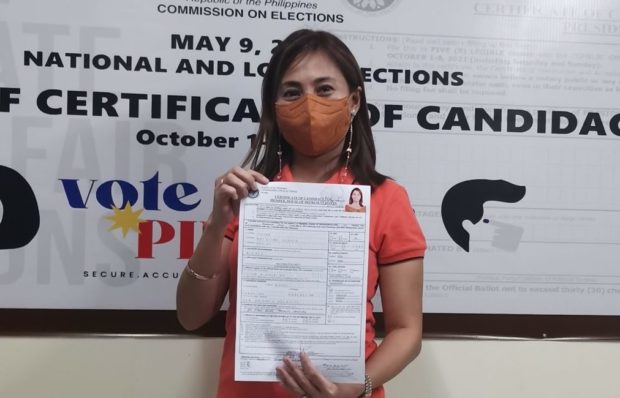SIM registration should be done by batch to avoid glitches, law co-author says

Bohol 3rd district Rep. Kristine Alexie Besas-Tutor. INQUIRER Visayas file photo / Leo Udtohan
MANILA, Philippines — One of the lawmakers who authored the Subscriber Identity Module (SIM) Registration Act has suggested that telecommunications companies process applicants by batch to avoid tech issues that marred the first few days of registration.
Bohol 3rd District Rep. Kristine Alexie Tutor said in a statement on Thursday that telcos can adopt a system where registration would be based on either the first and last digits of a mobile number — to prevent massive traffic on their registration sites.
Republic Act No. 11934 requires phone users with SIM cards to register their mobile numbers as a way of curbing phishing attempts, scams, and other cybercrime attacks propagated through calls and text messages. However, the first days of the law’s implementation saw several glitches and errors.
“As one of the authors of HB (House Bill) 0014, which became RA 11934 mandating SIM registration, I have to say that I wish the telco firms had adopted a phased-in incremental strategy on registering the tens of millions of subscriber identity modules, instead of opening the doors wide open all at once,” Tutor said.
“Moving forward, the telcos should instead have a more orderly way, based on the first and last digits of the SIM numbers, so not everyone would be registering from everywhere all at once. They could simply issue a schedule listing the batches of SIM numbers that should register per week,” she added.
Article continues after this advertisementAccording to the lawmaker, telcos should have known — and prevented — the surge of mobile phone users who would flock to the websites last Tuesday, December 27, or the first day of the SIM registration.
Article continues after this advertisement“They should have known their systems would be unable to handle the deluge of applications. Of course, their systems would be overwhelmed and crash,” Tutor noted.
Several mobile phone owners still find it hard to register their SIM cards, as many do not even reach the registration site provided by the government and the telcos.
READ: Tech issues mar first day of SIM card registration
R.A. No. 11934 was signed by President Ferdinand Marcos last October to crack down on phishing attempts and other scams sent through text messages of unidentified SIM Cards. Several government agencies, like the Department of the Interior and Local Government (DILG), lauded the law’s enactment, saying it would help the government curb cybercrime.
READ: Bongbong Marcos signs SIM Card Registration Act
Under the law, all existing SIM card users must register their number to their name by submitting requirements — personal details, identification cards, business names, and other information — on a website provided by the telecommunication company that provided the SIM Card.
Non-registration would eventually lead to the SIM Card being deactivated.
READ: SIM card registration: Things the public must remember
Similarly, Tutor reminded telcos to be critical of information being given to them, as admitting fake credentials and identities would render the law useless.
“I remind the telcos to be watchful against false information and false identification some might send to their online registration portals. If their vetting processes are not foolproof, then the fools would be able to circumvent RA 11934, fall through the cracks and victimize many with scams, fraud, and other deceptions,” she noted.
Under the law, there would be a 180-day period for phone users to register their SIM cards. In response to the glitches, the Department of Information and Communications Technology (DICT) launched a 24/7 complaint center tasked to receive reports and address issues concerning implementing the SIM Card Registration Act.
DICT spokesperson Anna Lamentillo said that the 24/7 complaint center, which may be accessed through hotline 1326, will stand as a “support system for the implementation of the SIM registration.”
READ: DICT launches 24/7 complaint center for SIM registration issues, concerns